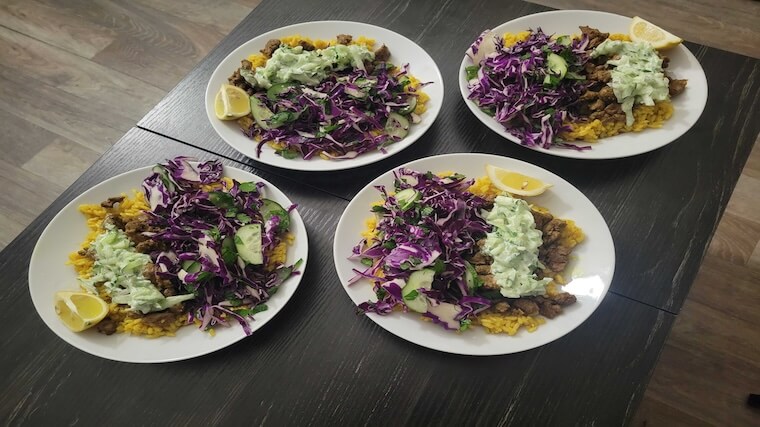We live in a world where everything has an app, so we can’t be surprised that weight loss apps exist. But if another calorie-counting app hits the market, registered dietitians everywhere might actually lose their minds. Actually.
Enter Noom. Noom is a popular weight loss app that taps into cognitive behavioral therapy (CBT) principles to help you lose weight. Its main MO? To teach you the science behind sustainable weight loss with a personalized approach. Noom claims to help you establish healthy eating patterns and make lifestyle changes that support long-term weight loss success.
But when you get down to the nitty gritty, does Noom work? In this Noom review, we’ll break down the ins and outs of the app (according to a registered dietitian), so you can decide for yourself. Because remember, weight loss isn’t a one-size-fits-all journey.
Editor’s Note: The content on BarBend is meant to be informative in nature, but it should not be taken as medical advice. When starting a new training regimen and/or diet, it is always a good idea to consult with a trusted medical professional. We are not a medical resource. The opinions and articles on this site are not intended for use as diagnosis, prevention, and/or treatment of health problems. They are not substitutes for consulting a qualified medical professional.
What is the Noom Diet?
Noom is a popular weight loss app that claims to help you shed pounds by getting to the root of your relationship with food. It’s more than a food-tracking app–it uses CBT (cognitive behavioral therapy) principles to help you understand your habits and how they impact your weight goals.
When signing up for Noom, you go through a fairly lengthy questionnaire before they give you your plan. They ask a series of questions to get a feel for who you are, your health goals, and your lifestyle factors. The program also asks about your height, weight, activity level, and employment to get an idea of your baseline. Then, the app calculates a conservative timeframe in which they believe you can achieve your weight loss goals.

But, wait, there’s more! Then you answer a series of questions related to your behavior profile. These questions focus on the psychology behind your desire for weight loss–think motivation, what health means to you, and body image. Depending on your answers, the goal time frame may move closer in or farther out.
Once Noom has your answers and gives you a recommended schedule for weight loss, you can access all of the app’s tools. Noom offers daily lessons on different topics that relate to your weight loss goals, such as sleep, stress management, and goal setting. You get to decide how much time you want to devote to these daily lessons, but you’re expected to engage with the app daily.
You also have access to a virtual coaching team and various tools to track your progress. Noom users (or Noomers as they’re called) can log their meals, set up an exercise regimen, and keep track of their biometrics all within the app.
Weight Loss Mapping
Weight mapping is a strategy used for weight loss, but it’s not something new that Noom brought to the conversation. Research shows that weight mapping is a key component to digital health programs like Noom. Studies show that it is especially beneficial for weight loss interventions that target behavioral nutrition, physical activity, and lifestyle habits.1
Weight mapping involves setting realistic, personalized milestones to help track and guide your progress over time. Instead of focusing on your end goal, weight mapping breaks the journey into smaller, more achievable steps, and it accounts for your medical history, lifestyle, and metabolism.
Weight mapping emphasizes the importance of every step along the way. It encourages more sustainable, long-term weight loss rather than rapid (often unsustainable) goals.
A healthy timeline for weight loss looks different for everyone. Research shows that losing one to two pounds weekly is generally safe for the average healthy adult.2 Losing weight any faster may come at the cost of your lean muscle mass and may cause nutrient deficiencies.3
A plan that works for one person may not be ideal for the next. Weight mapping encourages you to set personalized goals that align with your current health status, lifestyle habits, and motivation. It focuses on progress over perfection.
Plan Upgrades
If you want your Noom weight loss program to go beyond your food choices, you can add a variety of plan upgrades to your account. The Noom app allows you to cover other aspects of wellness, such as stress management, improving sleep, healthy aging, and GLP-1 management.
Noom will recommend plan upgrades based on your answers to their questionnaire. However, each upgrade comes at an additional cost. It’s important to explore your options and consider how these plan enhancements can help you improve your healthy habits.
Behavioral Profile
Noom’s psychology-based approach begins by crafting a personalized profile for you and your goals. When you sign up, you’re prompted to complete a pretty comprehensive quiz that covers things like your health goals, emotional triggers, day-to-day routine, and more. Noom uses this behavioral profile to create a weight loss plan for you.
The app uses this information to help you reshape lifestyle habits that may affect your body weight. Each Noom program also offers daily lessons that encourage mindfulness, emotional awareness, and self-reflection. They emphasize setting realistic goals, staying accountable, and working on long-term behavior changes.
Color-Coding Food Groups
Noom uses a color-coding system for its food logs to help users design a meal plan that’s rich in nutrients and low in calories. No foods are off-limits with Noom, but foods and food groups are categorized as green, yellow, or orange.
Here’s how it works:
- Green foods are encouraged because they’re lower in calories and rich in nutrients. You’ll find low-calorie foods like fresh fruit, vegetables, and whole grains in the green food category.
- Yellow foods are meant to be eaten in moderation. They contain more calories than green foods, but more nutrients than orange foods. You’ll find things like lean meats, more calorie-dense grains, and dairy in the yellow food group.
- Orange foods are considered high in calories and low in nutrients. Noom recommends limiting the intake of orange foods, such as fried foods, red meat, processed snacks, and sweets.
From a registered dietitian’s perspective, this system can be both helpful and problematic. On a positive note, this thinking can push people towards more nutrient-dense foods while still allowing for some flexibility. But are we looking through rose-colored glasses from this perspective?

The simplicity of this color coding system may actually be a huge drawback. It oversimplifies nutrition and can create an all-or-nothing mindset, especially for those prone to disordered eating patterns. Seeing some foods marked as orange may trigger guilt or avoidance, even if those foods can fit into a well-balanced diet in moderate portions. This may ultimately damage your relationship with food.
The color coding system also doesn’t account for cultural diversity or individualized nutrition needs. Well-balanced nutrition is more than just calories in and calories out, and grouping foods into three categories doesn’t allow for much wiggle room on that.
Noom’s color-coding system can be a helpful visual guide for portion control, but it should be used with caution. Ideally, it should be used under the guidance of your doctor or registered dietitian.
Pros of the Noom Diet
In a world of calorie-counting weight loss apps, Noom stands out. Noom offers many potential benefits for the average healthy adult who’s looking to lose weight, including:
Psychology-Based Approach
Noom emphasizes behavior change through cognitive behavioral therapy, or CBT. It helps users understand the why behind their eating habits, so they can make adjustments that lead to long-term weight loss. Research highlights CBT as an effective weight loss intervention, backing Noom’s claims.4
Human Connection
Many Noom plans come with access to a health coach and virtual support groups. While technology can play a role in weight management, research shows that human connection improves weight loss outcomes.5 Connecting with people who are on the same journey as you can be ideal for accountability and encouragement.
Personalized Plans
There is no one-size-fits-all approach to weight loss. This weight loss app can tailor your meals and physical activity recommendations based on your individualized goals, lifestyle, and preferences.

Progress Tracking
Research shows that tracking your health markers can support weight loss efforts.6 Noom users can track their progress at any time by logging various health markers. You can track your meals, exercise, weight, and other lifestyle factors all in one place.
Cons of the Noom Diet
There’s no such thing as a perfect weight loss app, and Noom is no exception. Potential drawbacks to Noom include:
Cost
Noom’s monthly cost may be worth it for some and a deterrent for others. Depending on the plan upgrades you choose, you could be paying anywhere from $40 to $70 per month, and it’s an auto-renewing plan.
Generic Coaching
While Noom users can access health coaches on the app, it’s important to remember that they may not be credentialed healthcare providers. They may not be equipped to offer customized guidance that accounts for your medical history, and their help may feel like generic coaching.
Calorie Focused
Despite its psychological principle, Noom still relies heavily on monitoring calories in versus calories out. Its daily calorie tracking, disguised in color-coded food groups, may not align with everyone’s approach to healthy eating.
Food Logging Isn’t For Everyone
Food logging can be tedious and time-consuming. Manually entering your meals and snacks isn’t ideal for everyone, especially those who cook meals from scratch or eat culturally diverse foods that aren’t readily available in the Noom database.
Daily Weigh-Ins
Noom recommends weighing yourself daily. However, daily check-ins aren’t ideal for everyone. Some research shows that even a small weight gain (which can be from any number of things) can be demoralizing and cause you to disengage from your goal chasing.8
Who Should Try the Noom Diet?
The Noom weight loss app may be the ideal choice for people who need a structured, psychology-based approach to weight loss. Because it combines food tracking with behavioral coaching, it may appeal to those who want to establish long-term weight management habits.
Noom may be especially intriguing for tech-savvy individuals. If numbers and trending data are your thing, you might find Noom’s stat tracking especially helpful.
Still, Noom isn’t for everyone. It places a strong emphasis on daily food tracking and regular app engagement. This can be overwhelming for some people, especially those with a history of disordered eating. Research has shown that diet and fitness apps may have negative effects on your mental health if not used mindfully.7
Additionally, while the app does provide access to coaches, they’re not necessarily credentialed healthcare professionals. Noom coaches may not be equipped to provide guidance that accounts for your unique, complex medical history.
With these considerations in mind, it’s crucial to approach Noom–or any weight loss app–with your critical thinking cap on. Consider talking with a doctor or registered dietitian before signing up for Noom. They can help you determine if the risks outweigh the benefits.
Final Word on the Noom Diet
The Noom weight loss app is more than just a way to stay on track with your daily calorie goals. It can help you understand your relationship with food to make lifestyle changes that support sustainable weight management.
Still, Noom isn’t appropriate for everyone. Those with a history of eating disorders may find Noom’s strict check-ins to be overwhelming or triggering. Those with a complex medical history involving chronic health conditions like high blood pressure or diabetes should talk with their doctor or registered dietitian nutritionist before signing up for Noom.
Noom Review: FAQs
What are the downsides of Noom?
Noom costs more than many other weight loss apps on the market, and it’s not appropriate for everyone. Plus, despite its claims that its not a restrictive diet, it still lumps foods into categories without much wiggle room. It doesn’t account for cultural tradition, social determinants of health, or complex medical histories.
How long does it take to see results from Noom?
Noom takes all the information you provide during your intake questionnaire and calculates a recommended timeframe to reach your weight loss goals. This will vary depending on your circumstances, but many people report that Noom promotes weight loss in just a few months.
Is Noom or MyFitnessPal better?
This is really up to you. Both apps offer a unique experience, supporting weight loss efforts in their own ways. If you prefer a psychology-based approach to your weight loss, Noom may be a better option.
References
- Palacz-Poborczyk I, Idziak P, Januszewicz A, et al. Developing the “Choosing Health” Digital Weight Loss and Maintenance Intervention: Intervention Mapping Study. J Med Internet Res. 2022;24(10):e34089. Published 2022 Oct 18. doi:10.2196/34089
- National Heart, Lung, and Blood Institute. Aim for a Healthy Weight: Key Recommendations.
- Fogarasi A, Gonzalez K, Dalamaga M, Magkos F. The Impact of the Rate of Weight Loss on Body Composition and Metabolism. Curr Obes Rep. 2022;11(2):33-44. doi:10.1007/s13679-022-00470-4
- Jacob A, Moullec G, Lavoie KL, et al. Impact of cognitive-behavioral interventions on weight loss and psychological outcomes: A meta-analysis. Health Psychol. 2018;37(5):417-432. doi:10.1037/hea0000576
- Gilder CM, Gorin AA, Huedo-Medina T, et al. Impact of social connectedness on weight loss outcomes in an online program. J Behav Med. 2024;47(1):144-152. doi:10.1007/s10865-023-00447-1
- Frie K, Hartmann-Boyce J, Jebb S, Oke J, Aveyard P. Patterns in Weight and Physical Activity Tracking Data Preceding a Stop in Weight Monitoring: Observational Analysis. J Med Internet Res. 2020;22(3):e15790. Published 2020 Mar 17. doi:10.2196/15790
- Eikey EV. Effects of diet and fitness apps on eating disorder behaviours: qualitative study. BJPsych Open. 2021;7(5):e176. Published 2021 Sep 24. doi:10.1192/bjo.2021.1011
- Hagerman CJ, Onu MC, Crane NT, Butryn ML, Forman EM. Psychological and behavioral responses to daily weight gain during behavioral weight loss treatment. J Behav Med. 2024;47(3):492-503. doi:10.1007/s10865-024-00476-4